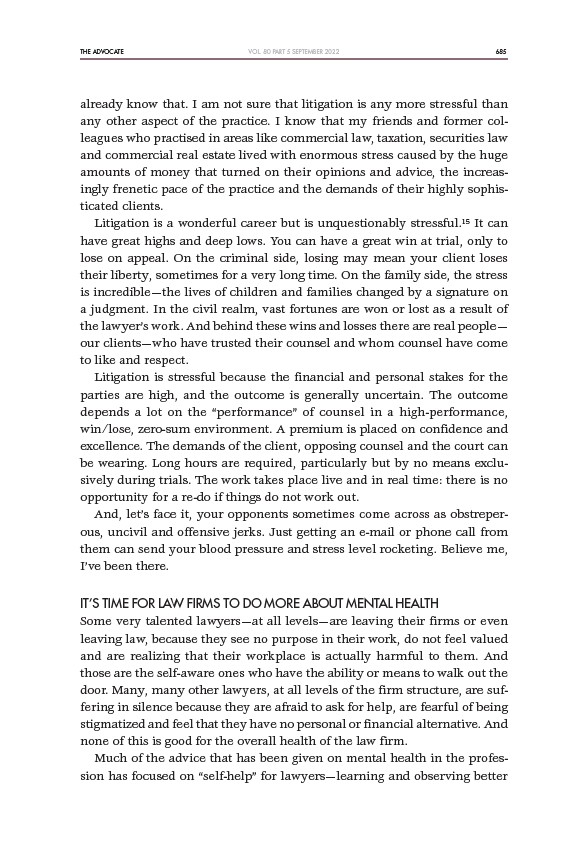
THE ADVOCATE 685
VOL. 80 PART 5 SEPTEMBER 2022
already know that. I am not sure that litigation is any more stressful than
any other aspect of the practice. I know that my friends and former colleagues
who practised in areas like commercial law, taxation, securities law
and commercial real estate lived with enormous stress caused by the huge
amounts of money that turned on their opinions and advice, the increasingly
frenetic pace of the practice and the demands of their highly sophisticated
clients.
Litigation is a wonderful career but is unquestionably stressful.15 It can
have great highs and deep lows. You can have a great win at trial, only to
lose on appeal. On the criminal side, losing may mean your client loses
their liberty, sometimes for a very long time. On the family side, the stress
is incredible—the lives of children and families changed by a signature on
a judgment. In the civil realm, vast fortunes are won or lost as a result of
the lawyer’s work. And behind these wins and losses there are real people—
our clients—who have trusted their counsel and whom counsel have come
to like and respect.
Litigation is stressful because the financial and personal stakes for the
parties are high, and the outcome is generally uncertain. The outcome
depends a lot on the “performance” of counsel in a high-performance,
win/lose, zero-sum environment. A premium is placed on confidence and
excellence. The demands of the client, opposing counsel and the court can
be wearing. Long hours are required, particularly but by no means exclusively
during trials. The work takes place live and in real time: there is no
opportunity for a re-do if things do not work out.
And, let’s face it, your opponents sometimes come across as obstreperous,
uncivil and offensive jerks. Just getting an e-mail or phone call from
them can send your blood pressure and stress level rocketing. Believe me,
I’ve been there.
IT’S TIME FOR LAW FIRMS TO DO MORE ABOUT MENTAL HEALTH
Some very talented lawyers—at all levels—are leaving their firms or even
leaving law, because they see no purpose in their work, do not feel valued
and are realizing that their workplace is actually harmful to them. And
those are the self-aware ones who have the ability or means to walk out the
door. Many, many other lawyers, at all levels of the firm structure, are suffering
in silence because they are afraid to ask for help, are fearful of being
stigmatized and feel that they have no personal or financial alternative. And
none of this is good for the overall health of the law firm.
Much of the advice that has been given on mental health in the profession
has focused on “self-help” for lawyers—learning and observing better